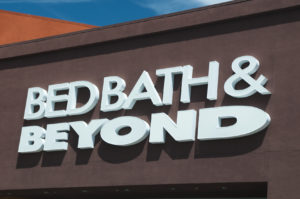The Greenville News ran an interesting piece on May 13, 2016, that talks to an issue plaguing companies across North America – unethical employees. Entitled, “Bed Bath & Beyond assistant manager indicted,” the article talks about an assistant manager who devised a “clever” but completely unethical scam to cheat the company that was employing him. Not only a bad apple here, but  someone in management conspiring as an unethical employee. Sad!
someone in management conspiring as an unethical employee. Sad!
According to the piece:
“An indictment alleges (the employee) purchased used or broken items from various places and exchanged them for new items, such as a Roomba vacuum cleaner, at Bed Bath & Beyond stores in South Carolina, North Carolina, Georgia and Virginia…
(He then) sold the items obtained from Bed Bath & Beyond on eBay (and) Approximately $81,902 of Bed Bath & Beyond merchandise was obtained while executing the scheme, which lasted about two years, according to court documents.” Unethical employees create significant problems for employers in all areas.
While the company has stated that the employee didn’t identify himself as an employee when making the returns that was by no means the issue at the heart of the matter. The employee’s penalty for his scam may be as high as 20 years in prison and a $250,000 fine for violating mail fraud laws; we feel it is the tip of a huge iceberg that may be costing companies hundreds of millions of dollars each year. No wonder many retailers are being more discreet with their return policies when unethical employees find ways to take advantage.
The opportunity to commit fraud against retailers and manufacturers has never been riper. There is a shadow economy where buyers on websites such as eBay bid for new merchandise (either in the original “boxes” or not). By and large, sellers are honest in their transactions but buyers never ask, and never know where the goods originate! I must admit to having purchased new clothing, an electric lawnmower, light fixtures and running shoes on sites such as eBay. While I have been quite happy with my purchases, I have no idea whether the goods were snapped up by a seller at a going-out-of-business sale or “fell off” the back of a truck. Ebay or other sites never ask where the goods originate and frankly, no one really cares.
How the assistant manager was caught may be a mystery, but certainly in racking up $82,000 in sales (give or take) he undoubtedly developed a pattern. Maybe he was seen returning to the same stores with the same items, or maybe he was turned in by a vigilant employee, but he got caught nonetheless. As he sits in a jail cell for fraud, he will begin to wonder if the sentence even for a year, is worth it. I guarantee I know what his answer will be.
The ethical wall
The reason I did not feel the urge to publicly shame this one employee by name, is that I have had friends working for large retail chains who have confided that they have seen all manner of schemes and fraud among their fellow employees as well. I hesitate to focus in on Bed Bath & Beyond here, as I have heard stories of theft and fraud across many retail programs.
Once the goods “get outside” the walls of the retailer they can disappear into cyberspace or other venues. Once on the market, the sales are unstoppable.
Is there a solution to thefts of this nature? There is! Unfortunately, many retailers have been hesitant to solve the problem through training. They consider it an unnecessary expense item, while neglecting to understand how the shrinkage problem may be occurring in the first place.
I have a friend who worked at a “Big Box” retailer for a while. I was quite impressed by the training programs they put him through before he even hit the sales floor. What completely baffled me was in all of the lessons in regard to theft, security and alarm systems, not one mention was made of ethics. No course, or even part of a course, was devoted to creating a sense of ethics; an ethical bond if you will, between employee and employer. Ethical training was completely disregarded.
“Loyalty” is a nice buzzword, it is a call to action, but in the low-wage, long-hour world of retail, loyalty often isn’t enough. An ethical bond, and an ethical sense, is far more than window dressing, it is a connection that states a common purpose and a choice to do right. Without this bond, or ethical wall if you will, retailers will continue to play a game of chance.
YOUR COMMENTS ARE WELCOME!

